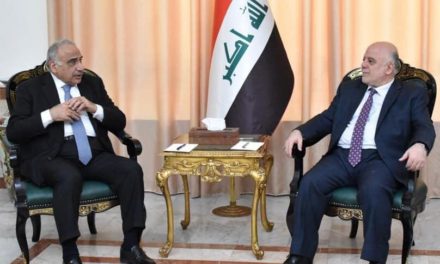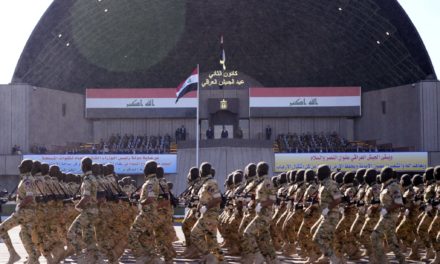With the federal election less than two weeks away, Iraq is on the precipice of taking a gargantuan step on the road to recovery from over a decade and a half of war and strife. Less than four years after more than a third of the country fell to Da’ish and observers around the world heralded “the end of Iraq as we know it”, millions of Iraqis are gearing up for what promises to be a defining moment in the country’s history.
The security situation has taken the back seat over the last few weeks for a number of reasons, mainly due to politics dominating the national dialogue. However, the military defeat of Da’ish has not closed the book on Iraq’s war on terrorism but merely started a new chapter. The terror organisation’s command structure has been decimated and its manpower and resources depleted, pushing its remaining elements to seek refuge in remote desert and rural farmland areas of the country. Da’ish leadership now seeks to rebuild its supply and sleeper cell networks and reestablish itself in major liberated cities and enclaves around the country.
Whether or not Da’ish will be able to mount significant attacks ahead of the May 12 election remains to be seen, but a recent audio message by the terror entity’s spokesman Abul Hassan Al-Muhajir threatened that anyone participating in the upcoming election will be targeted. Al-Muhajir added that, “Polling stations are a target for us, so stay away from them.” as he directly addressed the “Sunnis of Iraq”. Iraqi military officials responded derisively, claiming that such rhetoric is simply a ploy aimed at lifting their own morale. Nevertheless, security preparations in and around polling stations have been underway for weeks now and will likely be tightened further closer to May 12.
Assassination attempts against candidates and attacks on prospective polling stations in Anbar, Baghdad and Kirkuk have been sporadically reported since February with little success and no real evidence pointing towards a serious Da’ish campaign. A candidate in former Prime Minister Nouri Al-Maliki’s State of Law coalition was killed yesterday in the Al-Mashtal neighbourhood in eastern Baghdad but that was attributed to clashes due to a tribal dispute. In a more troubling development, footage was released last week of Da’ish terrorists executing two men in Tarmiyah, north of Baghdad, for participating in election campaigns. The identity of the victims and truth behind the footage has not been determined but it shows that while major attacks might prove too difficult for them, small-scale acts of intimidation are still achievable.
No notable terror attacks have taken place in Baghdad since January as the city continues to embrace a spell of safety with both arms. Baghdad’s relative tranquility is attributed to the successes of the Iraqi intelligence agencies working in tandem with security forces to completely degrade Da’ish terror cells inside the capital. Top security officials have alluded to an amalgam of methods used by intelligence units to infiltrate terror networks, locate their sources and identify their modes of operations then rapidly detain or eliminate their members and collaborators.
The situation in Kirkuk seems to have calmed down after a series of security flare-ups following Baghdad’s reassertion of federal control over the province. Concerted military campaigns by Iraqi Special Forces and Federal Police units both inside the provincial capital and its surrounding countryside districts have largely eliminated the threatening Da’ish and Kurdish separatist presence. Kirkuk will need a strong military presence over the next couple of months to ensure the election does not trigger a wave of terror or political violence as tensions between the Arab, Kurdish and Turkmen communities could be provoked by the result. Iraqi generals in Kirkuk have also reiterated that the Peshmerga will not be returning to the city.
Anti-Da’ish security raids are continuing at an unprecedented rate in Mosul and its peripheries, an indicator of just how many Da’ish terrorists and collaborators shrunk into the shadows after the city’s liberation. At least 60 terror suspects were detained over the last week, including at least half a dozen senior and foreign commanders in addition to a terror cell that was specifically tasked with assassinating political and administrative figures in Mosul. That particular cell is a telltale sign that Da’ish is aiming to blunt efforts to reconstruct the city’s governmental hierarchy. On Thursday, Mosul police announced that they had detained a suspect accused of executing dozens of Shi’a cadets during the Speicher massacre near Tikrit in June 2014.
While ordinary life has largely returned to eastern Mosul, the situation across the Tigris River remains dire, with civil defence teams this weekend reporting that they uncovered 40 corpses within a period of 24 hours. The fact that bodies are still being found more than eight months after fighting ended is a testament to how horrific the battle witnessed by western Mosul was. Some estimates put the amount of bodies still to be found in the city at over 3,000.
The western Anbar desert continues to witness meticulous clearing campaigns by different branches of the Iraqi military. Operations near Rutbah and northeast of Ramadi over the last couple of weeks have resulted in over forty Da’ish training camps, tunnels, guesthouses and makeshift weapons depots being discovered and/or destroyed. A recent desert raid by the Anbar Tactical Regiment resulted in a three-man terror cell responsible for several bombings near Fallujah and Karmah in eastern Anbar being detained. They had set up a small camp northeast of Ramadi to avoid capture.
Meanwhile, Da’ish terror cells in Diyala province seem to have decided to maintain a lower profile after a string of Iraqi operations in Muqdadiyah, Khanaqin, Kifri, Khalis and northeast of Ba’qubah dealt Da’ish a series of blows. A significant amount of weapons caches and safehouses were raided, disturbing Da’ish operations not in the province but nearby Salahuddin, Kirkuk and northern Baghdad as well.
Another positive development was the April 19 Iraqi Air Force airstrike on Da’ish targets in Hajin, eastern Syria. While the strike may have come as a surprise to many, Prime Minister Haider Al-Abadi convened his top military officials in early March after intelligence reports indicated that up to 3,000 Da’ish terrorists were building up in Hajin. Requests were reportedly made to the U.S.-led coalition to strike them but the Americans reportedly were reluctant to carry out air raids in the region. This was the not the first Iraqi airstrike on Syrian territory and will not be the last with military and intelligence officials confirming that other targets in eastern Syria are being monitored and could soon be dealt with in similar fashion.
The summation of reports coming from the different security theatres across the country point to a simple fact: Da’ish is gradually trying to rehabilitate itself rather than living to fight another day.
There is much to be pleased about and much to be desired in terms of Iraq’s security. The days of more than 30 simultaneously kinetic frontlines across the country are long gone along with Da’ish’s ability to conquer valuable territory. But complacency at such a crucial time would be catastrophic. Da’ish is down but not out and giving them enough space to rebuild their ranks could see a violent insurgency reigniting in Iraq’s liberated areas before the end of the summer. The military leadership in Iraq and Prime Minister Al-Abadi seem to be aware of this and have instructed the armed forces to not lift their boots off the neck of Da’ish for the foreseeable future. Sustained and preemptive military campaigns in Anbar, Diyala, Salahuddin, Kirkuk and Ninawa will ensure that Da’ish will never pose the type of cataclysmic threat it did in 2014.

Haidar Sumeri
Haidar Sumeri is a Middle East observer, mainly focusing on Iraq’s war on terrorism.










